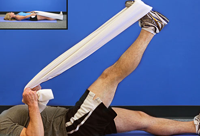Your Hospital Stay :
For a knee replacement procedure, it is of essence that you get admitted at a well-facilitated hospital, at least a couple of days before the operation. This will give you ample time to get used to the surroundings over there. All the necessary pre-operative medical tests can also be conducted with ease. We would here take a look at what would be your daily schedule on the day of the surgery, and the days preceding and succeeding it:
 Day Before The Surgery: Day Before The Surgery:
- Heart and chest inspection by the doctor and the anesthetist.
- Preparation of the knee area for the surgical procedure (done by nurses/ward attendants)
- Discussion about the anesthetic to be used.
- Marking the precise area where the surgery needs to be done.
- Application of ‘pre-med' medications (either as injection, or in the form of tablets).
- Clarification of queries and doubts (if any) from your side.
Night Before The Surgery/Day Of Surgery:
The knee replacement surgery can be scheduled either during the morning, or during the afternoon. Depending on that, pre-operative food and drinks are recommended:
- If your surgery is in the morning, you will be put on a fast from midnight.
- If your surgery is in the afternoon, you will be probably given a light breakfast, and hygienic fluids – at around 7am.
N.B. à If you have to fast, you will find all details regarding the time of fasting from the Bookings Office of the hospital.
In addition, the following would be done on the night before/morning of the knee replacement surgery:
- Shaving the area around your hip. This might be necessary to minimize the chances of infections.
- A thorough shower on the night/morning (as applicable) before the surgery. The operation site needs to be absolutely clean.
- n Education Class, where you will be provided a packet of medically approved anti-bacterial liquid soap. Use it for your shower.
- Escorting you to the operation theater.
- Application of the anesthetic (as decided upon on the previous day).
N.B: A standard knee replacement surgery requires one to two hours of time.
Post-operative care:
- Injecting Clexane inside the walls of your abdomen. This is necessary to avoid internal blood clotting.
- Relocation to the Recovery Room.
- Providing medically recommended elastic stockings (TEDS) to you (done by nurses).
- Initiation of 1-2 drips in your arm, to ensure that the fluid balance in your body remains intact.
- Application of pain-relieving medications (in cases of significant post-operative pains).
- Monitoring your pulse rate, blood pressure level, and breathing pattern. Once all body metrics are stable, you will be shifted back to your ward.
- Consumption of ample fluids, in the days following the surgery.
- Removal of the drips.
- Monitoring the post-operative scar (which should reduce to a narrow, faded white line).
- Start of physiotherapy sessions.
- Walking with the help of supports (crutches or sticks). This process would continue for four to six weeks – until you get your strength back in the legs.
- Application of pain-alleviating medications (if required).
- Continuation of the Clexane injection (if required).
- Constant collaboration between your surgeon and your physiotherapist.
- Starting to walk without support.
- Discharge from the hospital.
For a knee replacement surgery, you need to stay at the hospital for 4-7 days. Once the post-operative treatment is complete, you will be able to resume your regular activities, as was your routine earlier. |
